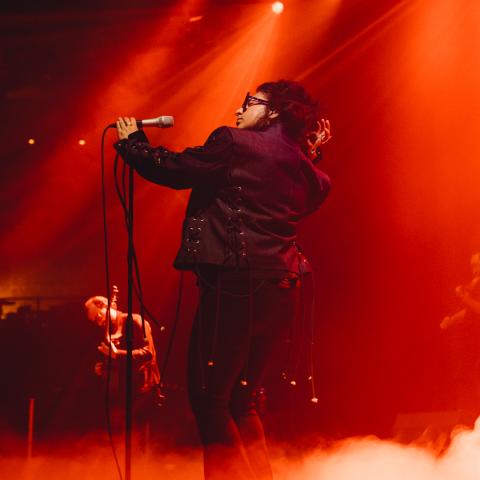Music Isn’t a Product

My sister, Aubrey Turner B.M. ’07, and I started our band, the Doubleclicks, like many folks do: We played at open mics, got a gig here and there, and recorded our first demo in somebody’s living room for next-to-nothing. And then we took an unconventional turn after our band had been together about a year—we started uploading music videos to YouTube. Every single week, for six months.
The songs weren’t always good, and the music videos were often just us sitting in my basement, singing to a webcam. We shed all thoughts of perfectionism and just made things, and we gave them away. Our audience found us through social media, through our quirky, unique songs being shared on podcasts, and through Reddit. Every week, we got more fans.
After three years of doing this, the band had almost 60 song videos on YouTube and a lot of fans. We launched a Kickstarter project to hire a producer for our album. We asked for $18,000, and ended up collecting $80,000. Finally, we were both able to quit our day jobs and devote ourselves full-time to the band. Since then, the Doubleclicks has run five more Kickstarter campaigns and has raised more than $100,000 on Patreon.
Today, when I’m not on tour or writing music, I work as a crowdfunding coach, helping other musicians run Kickstarter campaigns for their own projects. A lot of people I work with are looking to hire PR staff, labels, bookers, agents—and that’s all good for their careers. However, the fastest path to success with crowdfunding is simply to make things and release them.
But what can you make yourself for free? When you shed perfectionism, how can you connect directly with your audience? Whether it’s music videos on YouTube, livestreams on Twitch, collaborative stories on Instagram, photo collages on Facebook, or whatever brilliant, unique creative idea you have, making stuff on the internet and giving it away for free will help make you a presence in your fans’ lives.
Know that it may not work immediately; our first viral hit wasn’t one of our first 10 videos and yours probably won’t be either. However, you’ll learn; you’ll create. Plus, it’s fun. And it’s way easier to find an audience of 100, 1,000—even 10,000—new fans online than it is in person.
I know that giving music away seems like a counterintuitive way to make a profitable career in music—but really, truly, we’ve found that our career is more about an exchange of gifts and emotions than it is about swapping goods and money. The internet has changed the way people think about and consume music. When you shed the need to release perfectly polished material, you connect directly with your audience. I’ve found that the best way to get people to pay musicians is to show that you do, in fact, need money to make music happen. The audience sees that need, and because of the goodwill you’ve built up from making things, they want to help you.
When someone watches one music video, they spend about three to five minutes with your band. When someone watches 10 music videos, that’s 30-50 minutes. That’s not just YouTube views; that’s also their time investment. That’s a fan getting to know you, and your music becoming part of their lives. So when you ask them for money, or ask them to buy your albums and T-shirts, they’re excited about it. They want to support the art they already love.
Today, the Doubleclicks has hours and hours of content on our YouTube channel, and I’m writing this article from our crowdfunded European tour. We’ve never been signed to a label, we’ve never paid thousands for a PR campaign, but we have more than 3 million YouTube views, a 9,000-member mailing list, and six albums. Our fans are awesome and we love them, and their love for us has made our careers possible.
Laser Malena-Webber is the author of Crowdfunding for Musicians (Berklee Press), about fundraising and online audience-building for musicians of all genres and levels. They are also a member of the Doubleclicks, a folk-pop band whose last four albums have hit the top 10 on multiple Billboard charts. You can find their work and music at lasercampaigns.com and thedoubleclicks.com.




